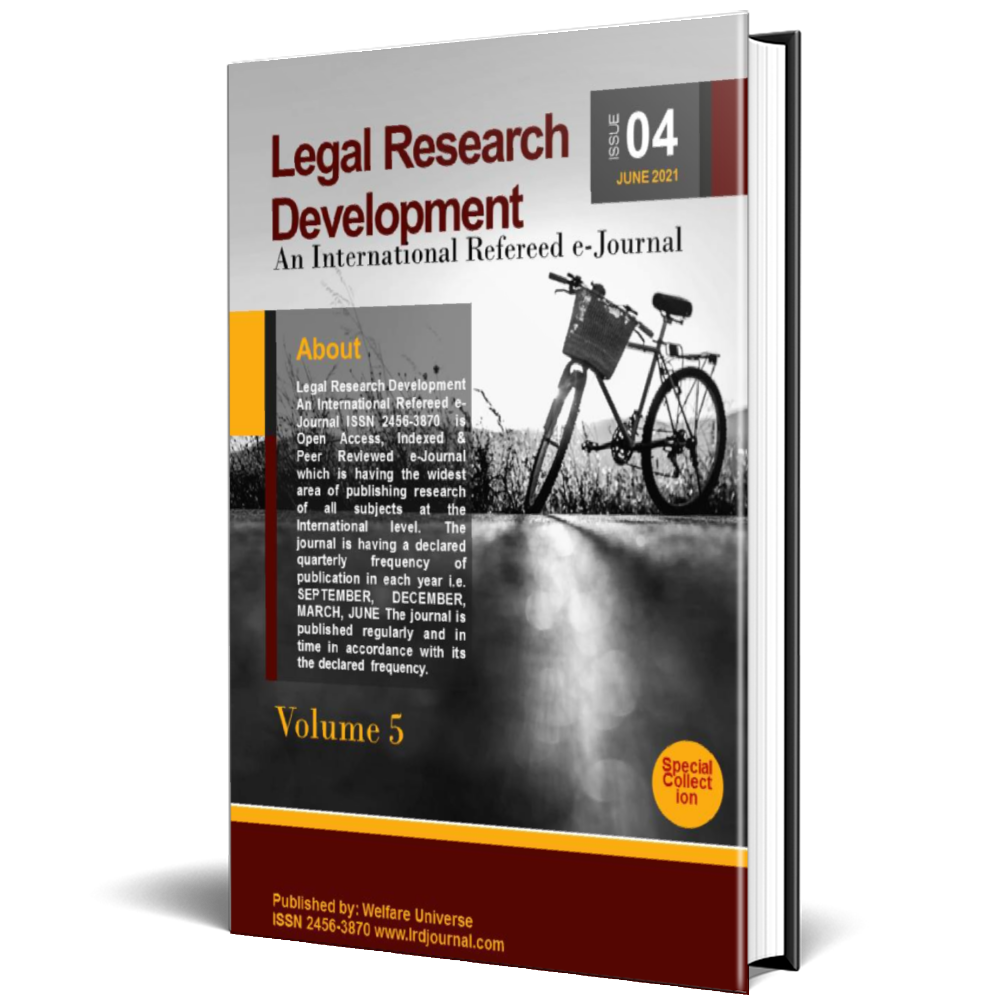A Study of Judicial Responses relating to Human Rights in India
DOI:
https://doi.org/10.53724/lrd/v4n1.06Keywords:
Justiciable fundamental rights, judicial responses, fundamental rights protector of human rights, Indian judiciary,, Indian Constitutional Law.Abstract
India is one of the largest democratic & sovereign countries in the world in which the Indian judiciary is also the integral foundation & structural pillar along with its unification & independency in the democratic system. Indian judiciary has the responsibility to deliver the fair & satisfactory justice to the people concerned in according to the provisions of Constitution of India as a protector of human rights which have been guaranteed as justiciable fundamental rights under Indian Constitutional Law by way of judicial responses but the Indian judiciary & judicial responses are subject to the exception and criticisms because both the same create the deepest effects & consequences on person individual & our society in the presence of rule of law for the purposes of the largest interest of public peace & fulfillment of the long cherished dream of welfare state with a view to accomplish the spirit of Constitutional Law of India and intention of the legislators. The responsibility for the enforcement of fundamental rights as human rights has only been furnished to the highest Court of India (Supreme Court under article-32) & High Courts in States (under article-226) of the Constitution of India. The People of our society repose the exclusive believe on the judiciary but the same is not free from the exclusions & exceptions it is absolutely relevant to place over here that delayed justice denied justice it has rightly said therefore due these reasons, in today’s scenario, in the world of globalization, people somewhere are losing their confidence and credibility because of the disadvantages exclusions & exceptions with the inclusion of other connected things which are not the good results for us, society, nation & the world. Corollary with regard to this, in according to the need of hour, the judicial accountability has not only become essential but also compulsory & mandatory in order to the answerability towards the paramount of transparent democracy under the Constitution of India where any person, society or system can never be free from the exceptions in the interest & welfare of world human, living creatures & creation.
References
AIR SC 1473 (1982)
Narendra Kumar, Constitutional Law of India: Allahabad Law Agency, Faridabad, Haryana 10th Editions page no. 511 (2018)
AIR SC 149 (1982)
Ibid SC 149 (1982)
J.N. Pandey, Constitutional Law of India: Central Law Agency, Allahabad 55th Editions page no. 429 (2018)
Pandey, supra 430
People Union for Democratic Rights v. Union of India AIR SC 1473 (1982)
J.N. Pandey, Constitutional Law of India: Central Law Agency, Allahabad 55th Editions page no. 432 (2018)
AIR SC 1087 (1987)
Ibid SC 802 (1984)
Ibid SC 298 (1981)
4 SCC 305 (1992)
J.N. Pandey, Constitutional Law of India: Central Law Agency, Allahabad 37th Edition 2014 page no. 392 (2018)
AIR SC 124 (1950)
Ibid SC 196 (1952)
Ibid SC 149 (1982)
Ibid SC 1087 (1987)
Ibid SC 802 (1984)
J.N. Pandey, Constitutional Law of India: Central Law Agency, Allahabad 55th Editions 2018 page no. 433 2018
Ibid Page No. 76
AIR SC 1125 (1988)
Supra SC 861 (2007)
Supra SC 1461 (1973)
Supra SC 731 (1958)
Supra SC 41 (1951)
Supra 1SC 27 (950)
AIR SC 1461 (1973)
Supra SC 2299 (1975)
Supra SC 1789 (1980)
1 SCC 309 (1992)
AIR SCW 5457 JLT (2015) SCJ 0 4 Nov. (2015)
Act 2014
The Constitution of India, Article 141
AIR SC 1643 (1967)
Ibid 1951 SC 458
AIR SC 845 (1965)
Supra SC 1461(1973)
Supra 2012 SC 2191()
Supra 1973 SC 1461()
Narendra Kumar, Constitutional Law of India: Allahabad Law Agency, Faridabad, Haryana 10th Editions Page No. 1171-1175 (2018)
AIR SC 1461 (1973)
Supra SC 2299 (1975)
Supra SC 412 (1993)
SCC(4) 611 (1995)
AIR SC 1461 (1973)
JT (2) SC 528 (2003)
AIR SC 1918 (1994)
Supra SC 1461(1973)
Supra SC 861 (2007)
Supra SC 1461 (1973)
Supra SC3127 (2006)
Supra SC 1461 (1973)
Supra SC 1125 (1988)
Supra SC 1461 (1973)
Supra SC 2299 (1975)
Supra SC 1789 (1980)
SCC 1, 309 (1992)
AIR SC 2299 (1975)
Supra SC 1125 (1988)
AIR SC 861 (2007)
Supra SC 1125 (1988)
Supra SC 268 (1994)
Supra SC 498 (2000)
Supra SC 2299 (1975)
Supra SC 861 (2007)
Supra SC 2363 (2003)
SCC 1, 309 (1992)
AIR SC 1789 (1980)
Supra SC 1789 (1980)
Supra SC 2407 (2014)
Supra SC 861 (2007)
Supra SC 1461 (1973)
Supra SC 1296 (2000)
Supra SC 3127 (2006)
Supra SC 2363 (2003)
Supra SC 2120 (1998)
Supra SC 1984 (2014)
AIR SC1771 (2002)
Dr. J.N. Pandey, Constitutional Law of India: Central Law Agency, Allahabad 55th Editions page no. 560-561 (2018)
AIR SC 124 (1950)
Supra SC 196 (1952)
Supra SC 2039 (1989)
Supra SC 746 (1981)
Supra SC 420 (1991)
SCC 4, 645 (1993)
AIR SC 507 (1978)
SC 4, 711 (1988)
AIR SC 180 (1986)
SC (5) 30 (2000)
AIR SC 420 (1991)
Supra SC 3036 (2005)
Supra SC 1548 (1978)
Supra SC 1360 (1979)
(1992) 1 SCC 225
SCC 549 (1996)
AIR SC 4 (2002)
SCC 1, 490 (1996)
AIR SC 898 (1980)
Supra SC 3011 (1997)
AIR SC 625 (1981)
SCC 2, 746 (1993)
SCC 260 (1994)
AIR 1986 SC 467
Supra Notes on Cases 236 (2008)
Supra SC 149 (1982)
Supra SC 1087 (1987)
Supra SC 610 (1997)
Supra SC1771 (2002)
AIR SC1643 (1967)
Supra SC 1234 (1996)
A Writ Petition SC (Civil) No- 400 of 2012 with also Writ Petition (Civil) No- 604 of 2013 decided on 15 April, 2014
18 December, (1962), Equivalent citations: (1963) AIR 1295, SCR (1) 332 (1964)
SCC 6, 632 (1994)
AIR SC 495 (1999)
Writ Petition SC (Civil), 494 of (2012) decided on 24 August, 2017
AIR Punjab & Haryana High Court, 353 (2003)
Ibid SC 760 (1981)
AIR SC 568 (1997)
SCC 2, 649 (1996)
A Writ Petition (Civil) SC No- 215 of 2005 decided on 09 March, 2018
AIR SCW 5457 (2015) JLT (2015) SCJ 0 4 Nov decided on 16 October, 2015
Act 2014
A Writ Petition SC (Civil) No-118 of 2016 decided on 22 August, 2017
Criminal Appeal No-416 of 2018 arisen out from SLP (Criminal) No-5661 of 2017decided on 20 March, 2018
AIR SC 477 (1973)
Ibid SC 498 (2000)
Ibid SC 649 (1963)
SLP (Civil) SC No-30621 of 2011 decided on 26 September, 2018
Writ Petition SC (Civil) No-494 of 2012 decided on 26 September, 2018
Writ Petition SC (Civil) No-73 of 2015 decided on 14 September, 2018
Writ Petition SC (Criminal) No-76 of 2016 decided on 06 September, 2018
Writ Petition SC (Criminal) No-194 of 2017 decided on 27 September, 2018 Point No-18 Page No-62
SCC 2, 549 (1996)
AIR SC 235 (2010)
Cr. LJ 3516 (SC) (2012)
4 SCC 463 (1987)
1 SCC 471 (1988)
4 SCC 750 (1996))
AIR SC 4016 (2004)
SCC 3 212 (1996)
AIR SC 1575 (1978)
Ibid SC 1579 (1980)
AIR SC 379 (2008)
Ibid SC 1822 (2009)
Ibid SC 3860 (2012)
Ibid SC 1485 (2012)
Ibid SC 3942 (2016)
Ibid SC 1751 (2012)
Ibid SC 2636 (2011)
Ibid Raj 63 (2009)
Ibid SC 473 (1983) decided on 07 April, 1983
Ramesh Kumar, The Role of Indian Judiciary with respect to Human Rights Law in India: JMSG an International Multidisciplinary e- Journal: Impact Factor: 4.032: UGC Approved e- Journal No.43919: ISSN- 2454-8367: Vol: II Issue III January: page no.01-09 (2017).
Downloads
Published
How to Cite
Issue
Section
License

This work is licensed under a Creative Commons Attribution-NonCommercial 4.0 International License.










